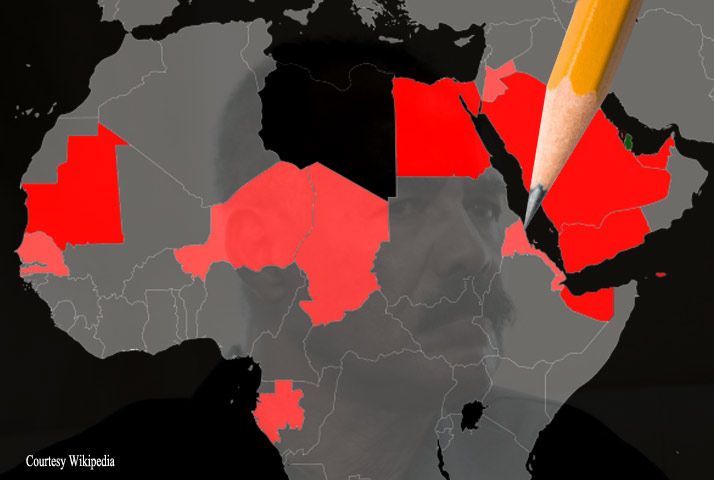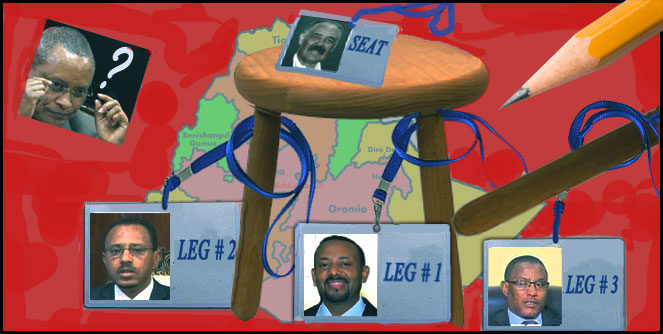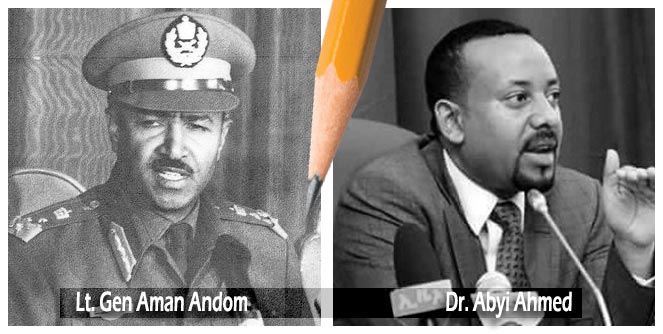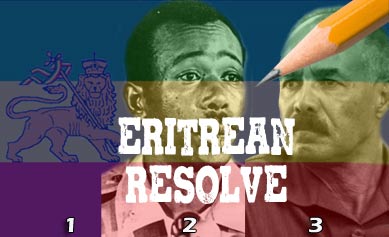A Stalemate Breaks Down in The Arabian Gulf

Generally, when there is a national conflict, the people follow. Their salvation can only come from wise friends—but only if the antagonists are willing to listen, and only if their friends are not inflaming their passions. Sadly, the confrontation in the Arabian Gulf is happening in the worst time when a friend both sides would have been more likely to listen to, the United States, is presided by an inexperienced politician. And sadly, for Eritreans, when their country is presided over by a mercurial man who trades friends for foes at the drop of a Riyal. And this was developing long before the Arab Spring.
There was a season for the brief, somewhat spontaneous, Arab Spring of 2010-12; it was an expression of the people’s depravity, hopelessness, and lack of freedoms. At the time, the Middle East appeared to transcend its modern history of bad governance. And though the revolt brought hope of freedom and liberty, the ill-prepared societies could neither transition from the uprising to an era of normality peacefully nor manage it properly, with the exception of Tunisia. At the end, the hopes of the people were dashed as their expressions got hijacked by vested interests, adventurers, and right wing conservative forces.
Today, Libya is bleeding, Egypt is limping and Syria is digging its grave deeper, while Iraq is counting years of instability and squandering its resources, and Yemen is under rubble. There is no Spring in the region, it is always freezing cold or stifling heat: Saudi Arabia and Yemen are bogged down in a war of attrition whose prices the Yemenis are paying. And Eritrea is not very far from those fires; its people are anxious thinking about eerie surprises that tomorrow could be holding for them.
Recently, the confrontation between Saudi Arabia and Qatar, both predominantly Sunni Muslim countries, appears to have reached the breaking point. Though the two countries’ contest is not new, what is new is the phobia of Iran, a country with whom Qatar has healthy relations. In such a situation, the people of the region have a responsibility to take a stand, at least a moral position. And that is why we hope for cool heads to prevail, and for the Kuwaiti initiative to succeed in bridging the gap between their conflicting brethren before further damages are inflicted on the region. And this we believe is the position of all Eritrean opposition forces and civil societies.
We have our own misgivings on the governments of the region; unfortunately, the good intention and generosity of Qatar towards Eritrea has enabled the Eritrean leader to be emboldened. Eritreans wished for Qatar’s neutrality if not its siding with the oppressed Eritrean people. At the same time, they know the ungrateful nature of Isaias Afwerki and are not surprised by the actions he took against Qatar.
In this David vs Goliath confrontation, one would think that Eritrea would instinctively support Qatar, particularly since it was the only lifeline to the Eritrean dictator for almost a decade. Failing that, one would have expected that Eritrea would have taken the admirable positions taken by Somalia, Sudan and Ethiopia: neutrality. Instead, the Eritrean regime issued a statement expressing its support for the strangulation of Qatar.
Now, we are apprehensive again because the Qatari sponsorship is being replaced by UAE and Saudi sponsorship and soon they will face the same ungrateful reaction.
Isaias Afwerki has betrayed the Qataris after they sponsored him for too long, and Eritreans have nothing to do with his ungratefulness and adventurous politics. They just wish Saudi Arabian and Emirati authorities would learn from the experience of Qatar in dealing with the Eritrean dictator.
Terrorism
The world knows that the most notorious terrorist organization are from the region, and as such people cannot act as if they are not produced (or funded) by the region and its strand of Islam that needs to be tamed. There is an urgent need for Islam’s heritage and curriculum to be revised, the Islamic fiqh (laws) to be standardized and codified, and the imposed new class of clergy that Islam doesn’t condone, to have its nails clipped. Having said that, it is obvious there are many qualified scholars who can address (and are) such issues, but in passing, we wanted to emphasize its importance.
Qatari Mediation Between Eritrea and Djibouti
While some progress was made in the mediation effort—resulting in, for example, the release of Djibouti prisoners of war in 2016—there has been, surprisingly, little progress in the demarcation of their common border. Surprising because the border is only 125 km, with even smaller disputed area (Ras Doumeira.)
After both Djibouti and Eritrea expressed their support for Saudi Arabia, Qatar abruptly pulled its peacekeepers. The next day, according to Djibouti, Eritrea deployed its troops to the vacated area which, if true, would be a violation of UN Resolution 1862 of January 2009.
The last thing the area needs is more militarization. A few miles North, in Asab, Eritrea, is the new base of the United Arab Emirates. Across the Red Sea, in Yemen, is a civil war that has been raging for two years, a war that the UAE is using Eritrean land to wage. Sudan has a long-running civil war; South Sudan has a bloody war waged by two war lords that has resulted in the displacement of more than a quarter of the population. Ethiopia has an uneasy peace and is being managed by state of emergencies and periodic flare ups; and Somalia has been, though recovering, traumatized by its quarter-century long civil war. Puntland and Somaliland are both providing a military base to the UAE and Djibouti hosts the military of at least three countries (France, US and China.)
As tense as the Eritrea-Djibouti standoff is, it could get even worse if it assumes an Africa vs Arab World dimension (since Djibouti is a member of the Arab League.) Admirably, the African Union has expressed its interest in defusing the tension by sending a fact-finding mission, an effort that may be pre-empted by the UN Security Council which intends to make it part of its agenda in its meeting on Monday.
Ironically, the Eritrean regime—whose 2009 sanction was based on the finding that it supported Somali armed groups and refused to acknowledge its conflict with Djibouti—was hoping that the sanctions would be lifted later this year since the Somalia-Eritrea Monitoring Group had reported Eritrea is no longer support Somali armed groups and it has acknowledged its dispute with Djibouti and has engaged Qatar.
The Side Effects
There will be many intended and unintended consequences to this conflict that has already drawn Iran, Turkey and, soon, Russia to the orbit. For our purposes, our focus will be on Eritrea.
In 2010, following the Eritrea-Djibouti skirmish of June 2008, Qatar offered to be a mediator, an offer that was accepted by both countries, who agreed to have Qatari peacekeepers.
With Qatar gone, and the status of the Eritrea-Djibouti mediation agreement is in limbo, and with Djibouti claiming it has evidence that Eritrea has occupied disputed territories, the UN is likely to find Eritrea in violation of an earlier resolution: Resolution 1862 demanding that Eritrea withdraw from the disputed territories within 5 weeks. Those 5 weeks lapsed in March 2009.
If history is a predictor of the behavior of Isaias Afwerki, he will learn nothing from history: he won’t agree to the African Union fact-finding mission, and will accuse Djibouti of accusing Eritrea first for its own behavior. At moments like this, when the world is looking for any political actor who will be a counterweight to PFDJ’s recklessness, the absence of an organized and articulate Eritrean opposition party becomes more glaring.
The stalemate has broken down in the Gulf and its effects are being felt in the Red Sea.
References
Eritrea-Djibouti Mediation Agreement
UN Resolution 1862 Demanding Eritrea Redeploy Its Troops
Eritrea Releases Djibouti Prisoners of War




Awate Forum